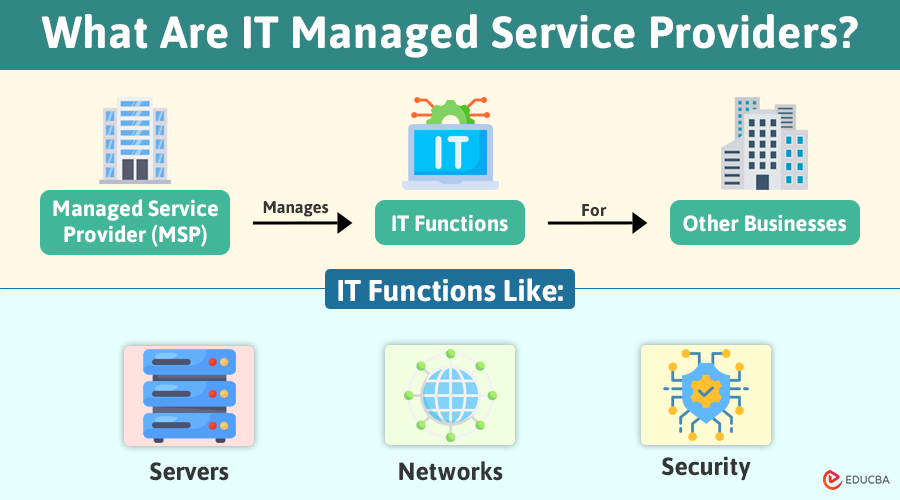
What Are IT Managed Service Providers?
IT Managed Service Providers (MSPs) are the companies that take over and manage certain IT functions for other businesses. Instead of a business handling IT services (like servers, networks, or security), it hires an MSP to take care of them. The MSP ensures that the IT systems run smoothly, handles updates and repairs, and provides support. This allows the business to focus on its core activities while relying on IT managed service providers to keep its technology running efficiently.
Key Components of IT Managed Service Providers
Here are the key components of IT managed service providers:
1. Infrastructure Management: This service takes care of your servers, storage, and network in the cloud, ensuring everything runs smoothly and can handle your needs.o
2. Application Management: Manages cloud-based apps, including installing, monitoring, and updating them to keep them running well and secure.
3. Security Management: This service protects your cloud environment with threat detection, vulnerability checks, encryption, and compliance to keep your data and apps safe.
4. Backup and Disaster Recovery: This service regularly backs up your data and ensures you can quickly restore it if something goes wrong, which helps minimize downtime and data loss.
5. Monitoring and Reporting: This allows you to monitor your cloud resources and apps to spot and fix problems quickly. It provides reports on performance, usage, and security.
6. Optimization and Cost Management: This analyzes how you use cloud resources to cut costs and improve efficiency, so you pay only for what you need.
Benefits of IT Managed Service Providers
IT managed service providers offer several benefits to businesses, including:
1. Cost Efficiency
Outsourcing cloud management to MSPs can lower costs related to hiring and training IT staff. MSPs offer predictable subscription pricing, which helps you manage your IT budget more effectively.
2. Enhanced Security
MSPs use advanced security measures like continuous monitoring, threat detection, and vulnerability assessments to keep your cloud environment safe. With increasing cyber threats, strong security is essential. According to the Ponemon Institute’s 2023 Cybersecurity Report, managing security services can reduce security breaches by 30%.
3. Scalability and Flexibility
MSPs offer scalable services so you can quickly adjust your cloud resources based on your needs. This flexibility is useful for your business growing quickly or experiencing seasonal changes. Gartner reports that scalability is a key reason businesses choose managed cloud services.
4. Access to Expertise
MSPs have skilled professionals who know the latest cloud technologies and best practices. Without extensive in-house expertise, you cannot fully take advantage of cloud services.
5. Improved Performance and Reliability
MSPs use advanced tools to monitor and optimize cloud performance. They address issues before affecting your business, increasing reliability and uptime. Forrester Research found that businesses using managed cloud services experienced a 50% reduction in unplanned downtime.
6. Focus on Core Activities
Outsourcing cloud management lets your internal team focus on strategic projects and core business activities instead of routine maintenance. This shift allows your IT team to drive innovation and effectively support business growth.
Role of IT Managed Services in Modern Enterprises
IT managed service providers play an essential role in modern enterprises by offering a range of benefits that support business efficiency and growth. Here is an overview of their role:
1. Supporting Digital Transformation
Many businesses today are pursuing digital transformation. Managed Service Providers are key to this process. They help companies move to the cloud, improve performance, and adopt new technologies that drive innovation.
2. Ensuring Compliance
Following industry rules is essential to prevent legal problems and keep customer trust. MSPs help businesses meet GDPR, HIPAA, and PCI DSS regulations by setting up necessary security measures and processes.
3. Enhancing Business Continuity
Keeping your business running smoothly is important, even during disruptions. Cloud-managed services offer disaster recovery solutions that help businesses recover data quickly and minimize downtime during outages or disasters.
4. Enabling Remote Work
Remote work has become more common, making flexible and secure IT systems essential. Cloud-managed services help businesses support remote work by giving secure access to cloud resources and applications from any location. A McKinsey & Company report found that businesses using cloud-managed services were better prepared for remote work during the COVID-19 pandemic, with 75% reporting enhanced remote work capabilities.
Final Thoughts
Managed services are crucial for modern businesses that want to fully use technology while staying secure, cost-effective, and efficient, while also streamlining MSP processes to enhance productivity. By letting experienced MSPs handle IT management, companies can concentrate on their main activities, drive digital transformation, and become more agile and scalable.
Recommended Articles
We hope this guide to IT managed service providers helps you understand their value. Explore these recommended articles to learn more about leveraging MSPs for your business needs.
